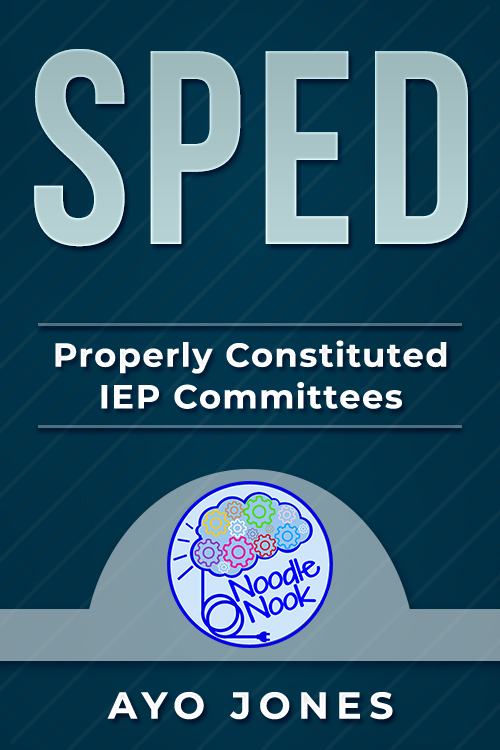Description
Federal guidelines and special education law are very clear on the people who need to be at every annual IEP meeting in order to create a properly constituted IEP. Most state guidelines further detail what role each person plays and their responsibility within the meeting. Every special and general educator should have a basic understanding of who should be in an IEP meeting as well as what they should do.
In this course Noodle Nook founder Ayo Jones outlines the members, roles, and responsibilities of a properly constituted IEP committee. In addition, she outlines some essential steps to take to ensure you are always complying with federal laws and state-mandated best practices.
This session is part of the Special Education Self-Assessment Series. The series is all about self-evaluation and gaining a better understanding of things you should do to meet your legally-mandated obligations for properly constituted IEPs.
In this 15-minute course, you will learn:
- Which committee members need to be present in IEP meetings
- What roles and responsibilities each member has during an IEP meeting
- What input members may provide to improve the development of a child’s IEP
- Plans that should be drafted to stay in line with federal guidelines
Most importantly, as part of this series, you will answer a series of self-assessment questions to determine how you can ensure your meetings, your special education department, and your district stay compliant with federal guidelines on properly constituted IEP committees. If you work with special education students, have a campus leadership position, or guide policy decisions for your district, then this is a practical course for you.







Barbara – PORT NECHES-GROVES ISD (verified owner) –
Informative
Konnor – PORT NECHES-GROVES ISD (verified owner) –
Nice
Ava – PORT NECHES-GROVES ISD (verified owner) –
Great course.
Tish – PORT NECHES-GROVES ISD (verified owner) –
Very informative, I really liked this one.
Christopher – PORT NECHES-GROVES ISD (verified owner) –
Totally awesome
Amberly – PORT NECHES-GROVES ISD (verified owner) –
It was great
Hannah – PORT NECHES-GROVES ISD (verified owner) –
informative
Carolee – PORT NECHES-GROVES ISD (verified owner) –
It is important info.
jeff – PORT NECHES-GROVES ISD (verified owner) –
Informative
Victoria – PORT NECHES-GROVES ISD (verified owner) –
Informative.
Denise – PORT NECHES-GROVES ISD (verified owner) –
This is a detailed overview of the Roles and Responsibilites of members attending the IEP meetings. It was a good review and I also learned more information in the process of this professional development.
John – PORT NECHES-GROVES ISD (verified owner) –
educational
Cecil – PORT NECHES-GROVES ISD (verified owner) –
Educational
Letitia – PORT NECHES-GROVES ISD (verified owner) –
Informative
Patrick – PORT NECHES-GROVES ISD (verified owner) –
Great
Erin – PORT NECHES-GROVES ISD (verified owner) –
Great
Kathryn – PORT NECHES-GROVES ISD (verified owner) –
very good
Celina – PORT NECHES-GROVES ISD (verified owner) –
good
Amy – PORT NECHES-GROVES ISD (verified owner) –
its a great way to learn more about IEP committees
Alexis – PORT NECHES-GROVES ISD (verified owner) –
helpful
Joshua – PORT NECHES-GROVES ISD (verified owner) –
Informative
Karen – PORT NECHES-GROVES ISD (verified owner) –
Practical.
Kenneth – PORT NECHES-GROVES ISD (verified owner) –
Good information
Erin – PORT NECHES-GROVES ISD (verified owner) –
good
Chris – PORT NECHES-GROVES ISD (verified owner) –
good
George – PORT NECHES-GROVES ISD (verified owner) –
informative
Bonnie – PORT NECHES-GROVES ISD (verified owner) –
Important information associated with the SPED department.
Kelsey – PORT NECHES-GROVES ISD (verified owner) –
Great information!
Monica – PORT NECHES-GROVES ISD (verified owner) –
Informative especially for new to the profession
Celeste – PORT NECHES-GROVES ISD (verified owner) –
Very informative
Holly – PORT NECHES-GROVES ISD (verified owner) –
informative
becky – PORT NECHES-GROVES ISD (verified owner) –
good
Nina – PORT NECHES-GROVES ISD (verified owner) –
Important information!
Kathy – PORT NECHES-GROVES ISD (verified owner) –
Good overview of the IEP committee.
Stacy – PORT NECHES-GROVES ISD (verified owner) –
Informative and concise
Dana – PORT NECHES-GROVES ISD (verified owner) –
Helpful information; great presenter
Lisa – PORT NECHES-GROVES ISD (verified owner) –
This can help regular ed teachers understand more about the whole process.
Sondra – PORT NECHES-GROVES ISD (verified owner) –
Very informative.
Linda – PORT NECHES-GROVES ISD (verified owner) –
I am glad I know what is required.
Karen – PORT NECHES-GROVES ISD (verified owner) –
Good.
Jill – PORT NECHES-GROVES ISD (verified owner) –
interesting and informative
Jackie – PORT NECHES-GROVES ISD (verified owner) –
informative